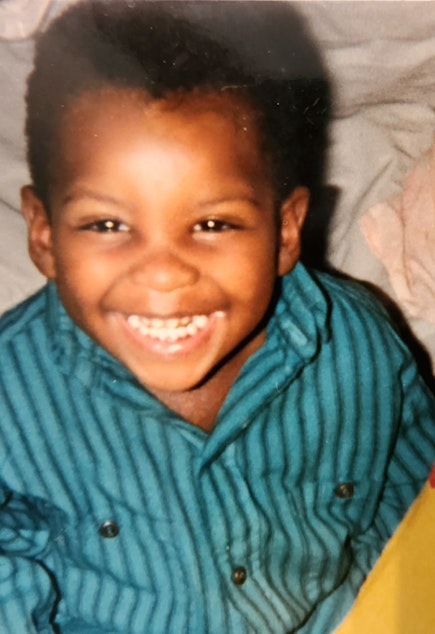As the world moves on, one mom's plea for Covid caution

More than 13,500 people have lost their lives to Covid-19 in Washington state. And deaths continue.
That leaves many families grappling with the grief of a recent Covid death while the rest of the world moves on.
But not everyone can move on in the same way.
Certain groups remain more at risk of severe illness and death from the virus. Including people like Keith Porter-Davis II, who was immunocompromised.
He died in March, just weeks before his 35th birthday.
His mom, Charlotte Baker, said she hopes that sharing his story can help people to think differently at this point in the pandemic, and remember there are community members who are at greater risk.
“If Keith had not have caught Covid he probably would still be here today,” Baker said. “I just want people to really think about that for a moment, to take themselves out of the equation, and to think about others.”
K
eith Porter-Davis II was Baker’s first child.
He grew up in the Seattle area and from a young age, he was happy and outgoing.
He was smart and vivacious. Baker called him “Mr. Sunshine.”
He loved sports of all kinds — snowboarding, football, rugby, baseball.
“If it was a ball, he was going to play it,” Baker said.
He carried that love of sports as he grew. He loved his family and when he went to college he loved his fraternity brothers.
He was generous, with a big smile and a big heart, Baker said.

“Even as he went into adulthood, he could never meet a stranger, you know. Anybody that he met; he was going to make that person feel as if they had known him his entire life,” she said.
Baker likes to think her son got his generous spirit from her.
“Giving back is very important to me," she said. "And I always made sure that all three of my kids understood how incredibly blessed we were, and how important it is to give back.”
Baker said her eldest child was always healthy growing up. But in his last year of college, Porter-Davis II got the flu. The infection traveled to his heart and damaged it.
His condition was managed with medications for years, but by 2020 he needed a new heart and was on the transplant list.
Baker said some people are on that list for years waiting for a heart, others die without ever receiving one.
“Keith wasn't really on that long. And we are so fortunate that a family made the decision to donate their family member’s heart. And we are extremely grateful for that,” she said.
Keith got his new heart in July of 2020, just a few months after the Covid-19 pandemic hit.
T
he Seattle area was the epicenter of one of the first Covid-19 outbreaks in the U.S. After his transplant, Porter-Davis II was at higher risk.
"It was the scariest thing in the world," Baker said.
Porter-Davis II went into full lockdown at his mom’s home. He didn’t go to the store, and nobody was allowed in the house, not even his siblings.
“I know this sounds ridiculous, but to the point where he wouldn't even touch money. Because we were just so worried about him,” Baker said.
She said his cardiologist had been very clear, he cannot catch Covid.
The isolation was hard on Porter-Davis II. But he stayed safe.
He was at the front of the line the moment vaccines were approved.
And by the end of last year, Baker said it felt as if they’d made it through.
“I was just thinking, you know, deep breath, we got through this," she said. "Things are getting back to normal, things are opening up, it’s just going great.”
The family gathered for Christmas and New Year’s for the first time since the pandemic began.
Then, in January of this year, Porter-Davis II got Covid.
His doctors sent him to the hospital.
P
eople who are immunocompromised are at higher risk for severe disease and death from Covid-19.
This is not a homogenous group; risk varies depending on each person’s circumstances. Organ transplant patients are among those at the highest risk.
Still, Baker said they stayed optimistic.
“I just kept thinking he's an overcomer,” Baker said.
But the virus took a toll on her son’s body. His organs started to fail.
Porter-Davis II spent 51 days in the hospital. It was tough on everyone.
Baker said she constantly felt the need to humanize her Black son to medical staff. Systemic racism remains an issue in the medical system.
Regardless of what he was going through, Baker said her son’s generous spirit persisted.
He constantly called asking her to bring food or gift cards for the staff who were working in tough conditions.
And from his hospital bed he recorded videos about his experience, encouraging people to consider organ donation.
Right to the end, Baker encouraged her son to be optimistic.
I
n March, she went out of town for a few days. Baker was on her way back to Seattle when she got a call from Porter-Davis II.
“He was terrified," she said. "And he said, ‘Mom, the doctors are telling me that it's not looking good.’”
Aware that her son took his cues from her, Baker stayed positive. She told him not to worry, that it was going to be fine.
Porter-Davis II was taken down to surgery and Baker planned to meet with this team the next day to make a plan.
But when she arrived at the airport in Seattle, she was met with the news that her son had died. Baker said it was the hardest day of her life.
“He had so much more living to do, he had so much more to give,” she said.
Baker said she feels like a part of her is missing. And she feels angry, she doesn’t understand why this happened to her family.
“I miss him tremendously. I just can't even begin to tell you how much I miss him,” Baker said. “He was my first heartbeat. Life goes on, but it's never the same.”
B
aker hopes she can help spare someone else from the same pain she’s experiencing. She wants people to understand the importance of taking precautions to protect not only themselves, but also those around them.
She tells everyone she can that she’s fully vaccinated and boosted, as was her son. Vaccines may not prevent a Covid infection, but they help decrease the risk of severe disease and death.
As a Black woman, Baker knows hesitation remains in communities that have good reasons to distrust public health. But she stresses that being vaccinated is crucial.
“Sometimes we have to step out on faith," she said. "And we have to trust that we're doing the right thing, not just for ourselves, but for those around us."
At a time when Covid-19 cases and hospitalizations have been increasing once more, and things like mask mandates remain a thing of the past, Baker hopes that people will keep others in mind as they move forward with their lives, especially those who remain at higher risk.
“Think about the person that you're standing next to in the store,” Baker said. “You don't know their story, you would never have been able to look at my son and know that he was autoimmune compromised, and that you could be jeopardizing him."
Baker said if sharing her story can prevent just one mother from experiencing the immense pain she’s going through, it will have been worth it.




